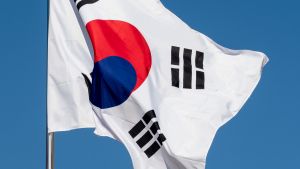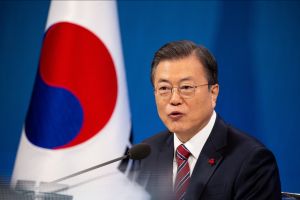Chicago Council survey data find majorities in South Korea view China as more of a security threat than a security partner and as more of an economic threat than an economic partner.
On May 21, South Korea’s President Moon Jae-in will meet President Joe Biden at the White House. In his first 100 days in office, Biden’s foreign policy has focused on repairing alliances and setting the administration’s policy toward China—in March and April alone, the administration participated in US-China talks in Alaska, 2+2 meetings in South Korea and Japan, trilateral talks among national security advisers, and Japanese Prime Minister Yoshihide Suga's visit to Washington. Moon’s visit will add North Korea to the agenda. The two leaders meet at a time when there are significant gaps on their preferred paths forward to dealing with Beijing and Pyongyang. However, recent Chicago Council surveys find that attitudes among publics in South Korea and the United States are remarkably similar when it comes to China and North Korea.
Key Findings
-
In Korea, majorities view China as more of a security threat (83%) than a security partner (12%) and as more of an economic threat (60%) than an economic partner (37%).
-
Views in the United States are similar—78 percent see China as more of a security threat than a security partner (20%) and 67 percent see China as more of an economic threat than an economic partner (30%).
-
But both publics place the relative threat from China in perspective and consider domestic issues more critical. In South Korea, low birth rates are viewed as the most critical threat facing the country (81%), while in the United States it is political polarization (65%).
-
Majorities in Korea say the US military presence in the Asia-Pacific increases regional stability (74%) and 83 percent think that presence should either be increased (15%) or maintained (68%).
-
A narrow majority of Americans (53%) support defending South Korea if North Korea invaded. That is down from 58 percent when the question was last asked in 2020.
Mutual Favorability Remains High
Despite thorny topics such as China and North Korea, the internal management of the US-ROK alliance has improved since Biden came into office. On March 8, Seoul and Washington agreed to a multiyear Special Measures Agreement, a military cost-sharing deal that was stalled because of former President Donald Trump's demands for a sharp increase in Korea's contributions.
Mutual favorability between the countries remains high. South Koreans give the United States a mean score of 6.0 on the 0–10 scale used for the survey in South Korea, where 10 is the most favorable score. And Americans give South Korea a mean score of 60 on the 0–100 scale, where 100 is the most favorable, used for the survey in the United States. But more importantly, for the South Korean public this goes beyond defense commitments. A majority (54%) think that the alliance is based on the security interests of both countries as well as shared values such as democracy and human rights.
Previous surveys have shown there is broad support among South Koreans for the long-term stationing of US troops in South Korea. Data from the most recent survey adds more context to that finding. Among the South Korean public, three-quarters (74%) say the US military presence in the Asia-Pacific increases stability in the region, and 83 percent think the US military presence in the Asia-Pacific should be maintained at its present level (68%) or increased (15%).
The American public also remains supportive of US forces in South Korea. Two-thirds of Americans (66%) say the United States should maintain long-term military bases in South Korea. Americans also remain committed to the defense of South Korea. A majority of Americans (53%) continues to favor the use of US troops to defend South Korea if North Korea invaded, down 5 percentage points from 2020.
Use of US Military to Defend South Korea
There has been some discussion about the circumstances that might justify using US troops in other parts of the world. Please give your opinion about some situations. Would you be in favor of or oppose the use of US troops: If North Korea invaded South Korea
March 19-21, 2021 | n=1,017
CHICAGO COUNCIL SURVEYS
China More of a Threat Than Partner, but Not a Top Critical Threat
As a US ally, South Korea’s security is backstopped by the United States, but its economy is heavily dependent on exports to China. This puts Seoul in an awkward position as the Biden administration continues to take a hard line on China. South Korea has thus far resisted calls to join the United States in a tougher approach toward Beijing and will likely continue to do so. Despite the gaps in current policy approaches, South Koreans and Americans take strikingly similar views of China.
Even with the economic reliance on China, the South Korean public is much more likely to say China is more of an economic threat (60%) than an economic partner (37%), likely due in part to China’s past economic coercion targeting South Korea. Views are similar in the United States (67% economic threat, 30% economic partner). And in both countries, roughly eight in 10 say China is more of a security threat than more of a security partner.
China as an Economic and Security Partner or Threat
In your view, is China more of an economic partner or more of an economic threat? (%)
In your view, is China more of a security partner or more of a security threat? (%)
US: March 19-21, 2021 | n=1,017
South Korea: March 24-28, 2021 | n=1,000
CHICAGO COUNCIL SURVEYS
While concerned about China, Americans and South Koreans consider domestic issues more pressing. In South Korea, the top potential threat included in the survey was low birth rates (81% critical). In the United States, the top potential threat was political polarization (65% critical). In both countries, roughly six in 10 view North Korea’s nuclear program as a critical threat. But in both countries, issues involving China were the least likely to be viewed as critical threats among those included in the survey.
Threats to South Korea's Interests
Below is a list of possible threats to the vital interests of South Korea in the next 10 years. For each one, please select whether you see this as a critical threat, an important but not critical threat, or not an important threat at all. (%)
March 24-28, 2021 | n=1,000
CHICAGO COUNCIL SURVEYS
Threats to US Interests
Below is a list of possible threats to the vital interests of the United States in the next 10 years. For each one, please select whether you see this as an actual critical threat, an important but not critical threat, or not an important threat at all. (%)
March 19-21, 2021 | n=1,017
CHICAGO COUNCIL SURVEYS
One area of continued tension between the United States and South Korea will be the use of Chinese technology in building communications networks. Thus far, South Korea has not joined the US-led Clean Network Initiative—established under Trump and set to continue under Biden—which seeks to eliminate Chinese tech companies from either building or supplying components for communications networks around the world. While the US State Department has declared South Korea’s SK Telecom and KT as “clean telcos,” LG U+ continues to source components from Huawei for its 5G networks. The South Korean public is split on prohibiting Chinese tech companies from building communications networks in South Korea, with 50 percent in support and 42 percent opposed. Meanwhile in the United States, 66 percent support such a prohibition versus 29 percent opposed.
Both Publics Committed to Strengthening the Alliance
While just 49 percent in South Korea say competition between the United States and China is a critical threat facing South Korea, there is concern in Seoul that South Korea may eventually be forced to choose between the United States and China. While such a theoretical choice would come with consequences, the South Korean public is clear in its preference. Two-thirds (67%) of the South Korean public prefers to strengthen relations with the United States even if this might diminish relations with China. In the United States, views are similar. Among Americans, 74 percent prefer to build up relations with traditional allies like Korea and Japan even if it might diminish relations with China.1
- 1
In the South Korea survey, the response options are “Building upon our strong relations with the United States even if this might diminish our relations with China” and “Building a new partnership with China, even if this might diminish our relations with the United States.” In the United States survey, the response options are “Building upon our strong relations with traditional allies like South Korea and Japan even if this might diminish our relations with China” and “Building a new partnership with China, even if this might diminish our relations with traditional allies like South Korea and Japan.”
Strengthening Alliances
Now thinking about [US/South Korea] policy, do you think [the US/South Korea] should put a higher priority on: (%)
US: March 19-21, 2021 | n=1,017
South Korea: March 24-28, 2021 | n-1,000
CHICAGO COUNCIL SURVEYS
While the question proposes a binary choice, reality is unlikely to be so clearly defined. Instead, both Seoul and Washington are likely to pursue strengthening alliances and building a new partnership with China whenever possible. Indeed, when respondents are given this third option—to build strong relations with allies and to pursue a new partnership with China—72 percent in South Korea and 63 percent in the United States prefer this option.2
- 2
In the South Korea survey, the third response option is “Both build strong relations with the United States and build a new partnership with China.” In the United States survey, the third response option is “Both build strong relations with traditional allies like South Korea and Japan and build a new partnership with China.”
Strengthening Alliances and Building Ties with China
Now thinking about [US/South Korea] policy, do you think [the US/South Korea] should put a higher priority on: (%)
US: March 19-21, 2021 | n=1,017
South Korea: March 24-28, 2021 | n=1,000
CHICAGO COUNCIL SURVEYS
Bridging Divides on North Korea
In a New York Times interview last month, Moon urged a reset on US-North Korea relations. Such a reset may not be forthcoming. The Biden administration’s North Korea policy review is unclear in its approach, and North Korea has not been welcoming. Statements from the summit on how the United States and South Korea plan to deal with North Korea will be closely watched.
South Koreans and Americans both hold negative views of North Korea, with North Korea receiving a mean score of 2.8 in South Korea on the 0–10 scale and a mean of 19 in the US on the 0–100 scale. Majorities in Korea (62%) and the United States (59%) see North Korea’s nuclear program as a critical threat facing their respective countries. Moreover, 50 percent in the United States say denuclearizing North Korea is a top priority for the United States in Asia, and 60 percent in South Korea say it is a top priority for the alliance with the United States.
Despite similar views between the publics on the broad strokes of North Korea, significant differences remain between the Moon and Biden administrations. The Biden administration seems unlikely to engage North Korea in a way that will satisfy the Moon administration as it enters its last year in office. And South Korea is unlikely to take a harder line on North Korea’s human rights abuses, which Seoul has sought to downplay.
Conclusion
Despite the gaps in policy between the United States and South Korea, the publics in both countries share similar views of China and North Korea. These shared public views may not be enough to overcome the short-term policy gaps, but they do suggest an underlying common understanding of the threats in the region, the value of the alliance, and the long-term commitment of the United States and South Korea to the alliance. The Biden-Moon summit will restate those shared beliefs but will have serious work to do when it comes to China and North Korea.
Methodology
The survey in South Korea was conducted March 24–28, 2021, by Hankook Research among a representative national sample of 1,000 adults 19 and older. The sample was constructed using RDD for mobile and landline phones, and the margin of error is +/- 3.1 percentage points at the 95% confidence interval. The survey in the United States was conducted March 19–21, 2021, by Ipsos using its large-scale nationwide online research panel, Knowledge Panel, among a weighted national sample of 1,017 people 18 or older, living in all 50 states and the District of Columbia. The sampling margin of error is +/- 3.1 percentage points and is higher for subgroups or partial-sample items. Results may not sum to 100 due to rounding, multiple responses, or the exclusion of “don't know” or unstated responses. The surveys were designed with input from American, South Korean, and Japanese experts as part of a broader project focusing on trilateral coordination in the Asia-Pacific. These surveys were made possible by the generous support of the Carnegie Corporation of New York and the Korea Foundation.


Related Content
 Public Opinion
Public Opinion
Majorities of South Koreans cite low birthrates in South Korea and North Korea’s nuclear program as larger threats than China's economic or military power.
 Public Opinion
Public Opinion
American's favorable views of South Korea are at an all-time high and a majority of Americans support using US troops to defend South Korea if invaded by North Korea.
 Global Politics
Global Politics
Karl Friedhoff examines the United States' nuanced understanding of policy options on North Korea's nuclear program.

